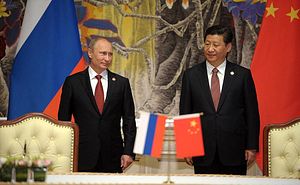China and Russia will launch an eight-day joint naval exercise in the South China Sea off the coast of China’s Guangdong province. The Joint Sea-2016 exercises between the two countries will involve surface ships, submarines, fixed-wing aircraft, helicopters, and amphibious vehicles, according to Chinese Navy spokesperson Liang Yang. The exercises will conclude on September 19.
Joint Sea-2016 is the latest iteration of an annual naval exercise between China and Russia that has been taking place since 2012. The exercise will be the first major drill of its kind involving China and a second country in the South China Sea since an international tribunal at the Permanent Court of Arbitration released its decision on Beijing’s maritime claims in a case filed by the Philippines. The Chinese People’s Liberation Army-Navy (PLAN) held live fire exercises in July, right before the release of the tribunal’s decision.
According to Liang, the Chinese and Russian navies will engage in a range of activities, including search and rescue drills, anti-submarine warfare, and “joint-island seizing missions.” The latter appears to be a new addition to the Joint Sea drills in 2016. Last year’s iteration in the Sea of Japan did not include an amphibious assault component, according to the Chinese Defense Ministry.
Russia and China have steadily increased their defense cooperation and Moscow has refrained from criticizing Beijing’s position on the South China Sea, where it claims almost 90 percent of the waters under its ambiguous nine-dash line claim that was overruled by the Hague-based arbitral tribunal in July.
In the aftermath of the July ruling, Russia offered a neutral statement on the tribunal’s award, voicing neither support nor outright opposition. Moscow’s position on the South China Sea disputes are carefully calculated to avoid alienating Beijing while maintaining Russia’s close relationship with Vietnam, a competing claimant with China that also has a close defense relationship with Russia. Indeed, while the Russian Navy will join the PLAN for anti-submarine exercises next week, Moscow is the vendor for Hanoi’s diesel-electric improved Kilo-class submarines.
Moreover, earlier this year, in anticipation of the Hague ruling, Chinese Foreign Minister Wang Yi and Russian Foreign Minister Sergey Lavrov reached what Beijing described as an “important consensus” on the South China Sea. According to a statement by the Chinese foreign ministry, “Lavrov expressed that Russia holds that the South China Sea issue should be resolved through political and diplomatic means such as direct dialogues and negotiations by parties concerned.”
The statement added that “Forces outside the region should not intervene,” ostensibly referencing the United States, which has been carrying out regular freedom of navigation operations in the South China Sea, drawing Chinese criticism. Ahead of this year’s Joint Sea exercise, a Chinese Defense Ministry spokesperson said in a press conference that the drill “does not target any third party.”
China and Russia, while not formal allies, have steadily increased their military-to-military contacts and cooperation. In addition to naval exercise, the two countries cooperate on counterterrorism, holding the Peace Mission exercises annually. “Russia and China stick to points of view which are very close to each other or are almost the same in the international arena,” Russian President Vladimir Putin said in June, during a visit to China.

































